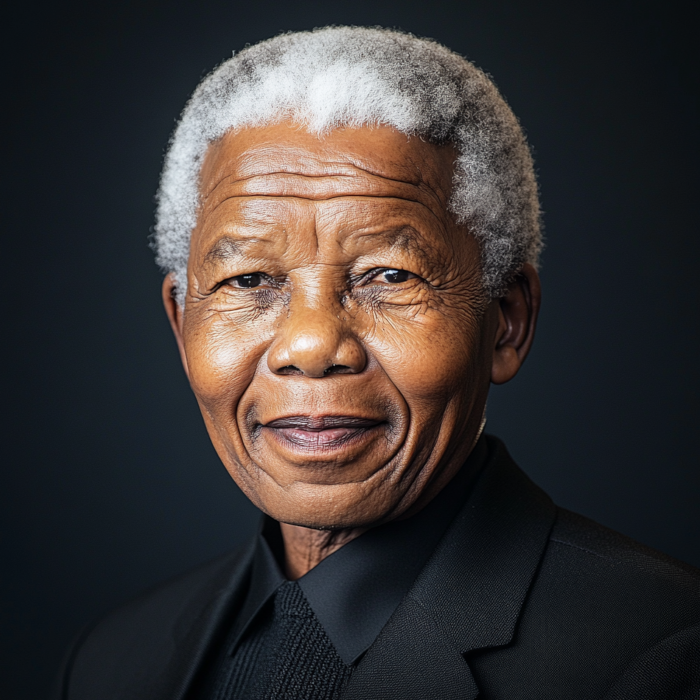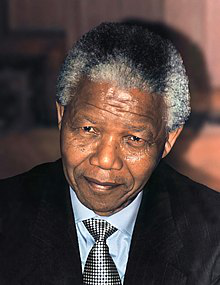


Nelson Mandela (1918–2013) was a South African anti-apartheid revolutionary, political leader, and philanthropist who became the first Black president of South Africa from 1994 to 1999. He is celebrated worldwide for his role in dismantling apartheid, promoting racial reconciliation, and advocating for peace and social justice. Mandela's legacy as a symbol of resistance, resilience, and forgiveness has made him one of the most revered figures in modern history.
Birth and Background: Nelson Rolihlahla Mandela was born on July 18, 1918, in the small village of Mvezo in the Eastern Cape province of South Africa. He was a member of the Thembu royal family, part of the Xhosa nation. His father, Gadla Henry Mphakanyiswa, was a local chief and counselor to the Thembu king, but Mandela grew up in humble circumstances. His birth name, Rolihlahla, means "pulling the branch of a tree," or colloquially, "troublemaker."
Education: Mandela was the first in his family to receive a formal education. He attended a Methodist missionary school, where a teacher gave him the English name "Nelson." He later attended Clarkebury Boarding Institute and Healdtown, a Wesleyan secondary school. In 1939, Mandela enrolled at the University of Fort Hare, the only Western-style higher education institution for Black people in southern Africa at the time. However, he was expelled for participating in a student protest. He completed his Bachelor of Arts degree through correspondence at the University of South Africa (UNISA) and began studying law at the University of the Witwatersrand.
Political Awakening: Mandela's political activism began in Johannesburg, where he became involved with the African National Congress (ANC) and its Youth League. He was deeply influenced by the racial injustices he witnessed under the apartheid system, a policy of racial segregation and discrimination enforced by the South African government. In 1944, he co-founded the ANC Youth League, advocating for a more radical approach to fighting apartheid.
Defiance Campaign and ANC Leadership: In 1952, Mandela was appointed National Volunteer-in-Chief of the ANC's Defiance Campaign against unjust apartheid laws. This campaign involved mass civil disobedience, and Mandela traveled the country organizing protests. His efforts led to his arrest and conviction under the Suppression of Communism Act, but the campaign significantly increased his prominence within the ANC. By 1952, Mandela had become the ANC's Deputy National President.
Formation of the ANC's Armed Wing: As the apartheid regime intensified its repression, Mandela and other ANC leaders concluded that nonviolent resistance alone was insufficient. In 1961, Mandela co-founded Umkhonto we Sizwe ("Spear of the Nation"), the armed wing of the ANC, which carried out sabotage attacks against government targets. Mandela believed that armed struggle was a necessary response to the violence of the apartheid state.
Arrest and Rivonia Trial: In 1962, Mandela was arrested and convicted of leaving the country illegally and inciting strikes. He was sentenced to five years in prison. While in prison, he was charged again in 1963, along with other ANC leaders, for sabotage and conspiracy to overthrow the government in what became known as the Rivonia Trial. In 1964, Mandela was sentenced to life imprisonment. During the trial, Mandela delivered his famous speech from the dock, declaring his willingness to die for the cause of freedom.
Robben Island and Imprisonment: Mandela spent the next 27 years in prison, the majority of them on Robben Island, a maximum-security prison off the coast of Cape Town. Despite the harsh conditions, Mandela continued to be a leader and mentor to his fellow prisoners. His imprisonment became a global symbol of the struggle against apartheid, sparking an international movement for his release and the end of apartheid.
Global Campaign for Release: The "Free Nelson Mandela" campaign gained momentum throughout the 1970s and 1980s, with activists, politicians, and ordinary citizens around the world calling for his release. Economic sanctions and international pressure against South Africa's apartheid regime increased, making Mandela's freedom a central demand of the global anti-apartheid movement.
Release from Prison: On February 11, 1990, after intense domestic and international pressure, South African President F.W. de Klerk ordered Mandela's release from prison. Mandela walked out of Victor Verster Prison to a world that had changed significantly during his incarceration. His release marked the beginning of the end of apartheid.
Negotiating the End of Apartheid: Following his release, Mandela led negotiations with de Klerk and other South African leaders to dismantle apartheid and establish a multiracial democracy. These negotiations were fraught with tension and violence, but Mandela's commitment to reconciliation and his leadership were crucial in avoiding a civil war.
Nobel Peace Prize (1993): In recognition of their efforts to peacefully end apartheid and lay the foundations for a new South Africa, Mandela and de Klerk were jointly awarded the Nobel Peace Prize in 1993. The award highlighted Mandela's role as a global symbol of peace and justice.
First Black President of South Africa: In April 1994, South Africa held its first multiracial elections, in which Mandela was elected the country's first Black president. His inauguration on May 10, 1994, was a historic moment, symbolizing the triumph of democracy over apartheid. Mandela's presidency focused on reconciliation between the country's racial groups, nation-building, and laying the groundwork for a more equitable society.
Truth and Reconciliation Commission: One of Mandela's most significant initiatives as president was the establishment of the Truth and Reconciliation Commission (TRC) in 1995. Chaired by Archbishop Desmond Tutu, the TRC aimed to address the atrocities committed during apartheid by offering amnesty to those who confessed their crimes and sought forgiveness. The commission played a critical role in helping South Africa heal from its divided past.
Retirement and Global Elder Statesman: Mandela retired from active politics in 1999, after serving one term as president, and was succeeded by Thabo Mbeki. In retirement, Mandela remained an active global figure, advocating for peace, human rights, and HIV/AIDS awareness. He established the Nelson Mandela Foundation, which focuses on promoting his legacy and addressing social justice issues.
Death: Nelson Mandela passed away on December 5, 2013, at the age of 95, at his home in Johannesburg. His death was met with a global outpouring of grief and admiration. Leaders from around the world paid tribute to Mandela's extraordinary life and his contributions to the cause of freedom, justice, and equality.
Symbol of Resistance and Reconciliation: Nelson Mandela is widely regarded as one of the greatest leaders of the 20th century. His commitment to justice, equality, and reconciliation in the face of immense personal sacrifice made him a global symbol of resistance against oppression. Mandela's ability to forgive his oppressors and lead South Africa through a peaceful transition to democracy is one of his most enduring legacies.
Influence on Global Human Rights: Mandela's struggle against apartheid and his advocacy for human rights have inspired movements for justice and equality around the world. His life story continues to inspire activists and leaders who fight against oppression, racism, and inequality.
Cultural and Political Legacy: Mandela's legacy is commemorated through numerous honors, including statues, schools, streets, and institutions named after him. His autobiography, Long Walk to Freedom, published in 1994, remains a best-seller and offers a detailed account of his life and the struggle against apartheid. Mandela Day, celebrated on his birthday, July 18, is recognized by the United Nations and encourages people worldwide to engage in acts of service to honor his legacy.
Nelson Mandela's life and legacy embody the ideals of courage, justice, and reconciliation. His journey from political prisoner to president of a democratic South Africa is a testament to the power of resilience and the enduring human spirit. Mandela's commitment to peace, his advocacy for human rights, and his dedication to building a more just and equitable world continue to resonate globally, making him a figure of universal admiration and respect. His example of leadership, humility, and forgiveness serves as an enduring inspiration for people around the world who seek to create positive change in their communities and beyond.

We use cookies
We use cookies and other tracking technologies to improve your browsing experience on our website, to show you personalized content and targeted ads, to analyze our website traffic, and to understand where our visitors are coming from. Privacy Policy.